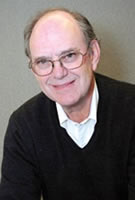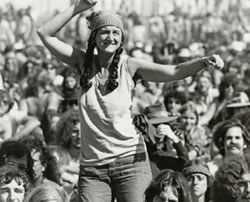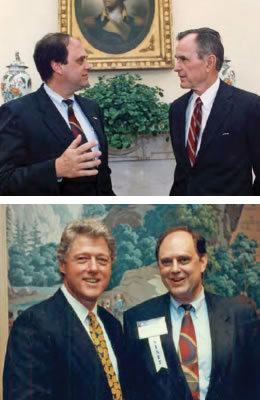Public protests were common; drugs and riots weren't uncommon; and crowds of young people spent their summers in tents on city grounds - no jobs, no parents, no plans - simply because Ann Arbor was a happening place to be. "It was a very different time," says Ford School alum Don Borut (MPA '65) of Ann Arbor in the '60s. That's a bit of an understatement.
 |
|
Don Borut (MPA'65) |
After interning in the Ann Arbor city administrator's office as a policy student in 1964, Borut was hired as assistant to the city administrator after graduation and stayed through what was arguably Ann Arbor's most turbulent era. To keep the peace, city officials launched a free summer rock and roll concert series in Huron Park. Borut's job? To keep it safe; to make it work. That was no small feat. "Every Sunday we'd have 5,000 kids in the park and this wild music," recalls Borut. "Every Saturday night I'd pray for rain."
To police the concerts, without inviting unnecessary clashes in an era that seemed to provoke them, Borut hired "Psychedelic Rangers" who monitored the park and called Ann Arbor's standing police force only if needed. In a 1971 article written by the Rangers for the Ann Arbor Sun, the 'people's peace force' explained it would be "keeping the traffic happening and making sure [concertgoers] don't forget and mess up straight people's Sundays by walking all over their back yards and their golf courses." They'd also be "keeping a check on dealing of bogus downer-drugs and too flagrant open dealing of any kind...and helping the hurt or bummed-out find medical facilities."
"Ann Arbor leaders did some very creative things back then," says Borut of the '60s. He's referring not just to the outdoor concerts and their minimally-invasive policing mechanisms, but to policies that integrated low-income housing units in each new development, free summer recreation programs for youth, and treaties the city brokered between student activists and police. Borut should know creativity when he sees it, too. He's spent the last 40 years in Washington, DC, advocating for local government leaders and fostering local government innovation first as deputy director for the International City/County Management Association (ICMA) and later as executive director of the National League of Cities - a position he held for 22 years until his retirement this January.
 |
|
Rockin' and rollin' at an Ann Arbor Free Concert, a series that began in 1966. |
When asked what people should know about the National League of Cities - which with 100 staff members and 19,000 member cities, towns, and villages, is one of the nation's most powerful training and advocacy organizations for local government leaders - Borut is quick to answer. The National League of Cities was founded by the leaders of ten state municipal leagues back in the 1920s, he tells me. "It's not the parent of state municipal leagues; it's the child."
That relationship is clear in the way the National League of Cities develops the policy proposals that it advocates for on Capitol Hill. While federal government collaboration is often stymied and stalled by partisan bickering, the National League of Cities takes a "big tent" approach, inviting diverse viewpoints. A few years ago, for example, the League launched an effort to develop a policy proposal for comprehensive federal immigration reform by appointing a diverse committee of representatives. "The committee was chaired by a Los Angeles council member who had been a police officer," says Borut. "Some members of the committee were adamant about enforcement. Others wanted undocumented immigrants out. Others recognized that immigrants play an important role in the country and wanted to create pathways to citizenship." They worked together well and quickly, though, and the policy platform they prepared focused on the perspectives they shared. Because the committee itself had been so diverse, and had still found points of consensus, Borut and his staff were able to speak with a strong voice in conversations with Congress and the White House.
 |
|
Borut with Presidents Bill Clinton and George H.W. Bush, two of the many residents he worked with during his tenure at the National League of Cities. |
Heidi Goldberg (MPP '98), the league's program director for early childhood and family economic success, concurs about the nonpartisan spirit of city leaders. "One of the cities I work with very closely is a small city in Texas. I found out after working with them for a while that many of the key anti-poverty champions were Republicans," says Goldberg. "It can be surprising to us in DC, where political affiliation can be so divisive."
In addition to policy development and advocacy, the National League of Cities recognizes and disseminates local government innovations, is the go-to source for data on city governance, and advocates on behalf of the public sector and those who serve. "So often, you hear disparaging remarks about elected officials and people in the public sector," says Borut, "but these are people who are willing to run for office, willing to make decisions that are tough, and trying to make the right decisions to solve a region's problems in a difficult financial climate. I'm a passionate advocate for local elected officials, and for what the public sector does. It's not sexy work, but it's really important.
Photo: Bentley Historical Library, University of Michigan
Photo: John and Leni Sinclair Papers, Bentley Historical Library, University of Michigan
Below is a formatted version of this article from State & Hill, the magazine of the Ford School. View the entire Spring 2013 State & Hill here.